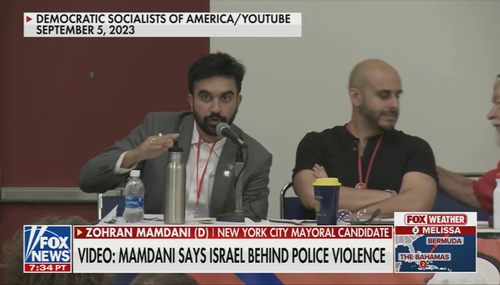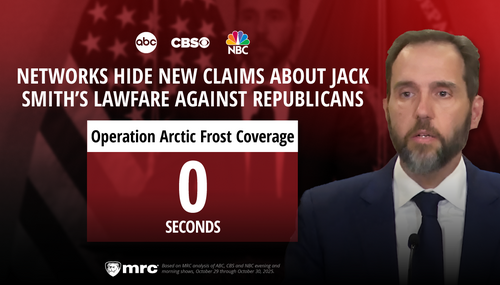
It all started with Gregory asking whether Snow could see the
report as "anything other
than a rejection of this President's handling of the war?" The White
House has a video of the entire conference which is available in a
streaming Real Video here (fast forward to 3:50 into the clip for the relevant part). The NBCer asked this question after reading aloud three out-of-context setences from the report.
Gregory's question and the little back and forth (see past the jump for the transcript) is yet another example of how news conferences have become less a question of providing useful information to the public and more about the media asking captious, leading questions that no public spokesperson is ever going to answer. This is not to say that reporters cannot ask a tough question, but to put on a show as Gregory very clearly tries to do at each and every conference insults the intelligence of everyone involved, be they reporter, government representative or a person at home sighing in exasperation.
Unidentified Reporter: Tony, about the evaluation, can I just start on the point of --
TONY SNOW: I think David is out-shouting you --
Reporter: Well, that's not fair at all --
SNOW: We'll go to David. David, yes.
DAVID GREGORY: On the evaluation in the report it says the following -- the co-chairs say the following: "'Stay the course' is no longer viable. The current approach is not working. The situation is grave and deteriorating." Chairman Hamilton says he is not sure whether the situation can be turned around. Can this report be seen as anything other than a rejection of this President's handling of the war?
SNOW: Absolutely. And I think you need to read the report --
GREGORY: I have.
SNOW: You've read the whole report?
GREGORY: No, I've gone through a lot of the recommendations.
SNOW: Okay, well, I read the whole report, and I will tell you, also based on the conversations --
GREGORY: But this is from the Chairman.
SNOW: Well, if you listen to the Chairman you will have noted that he's not trying to --
GREGORY: They were all quotes, Tony.
SNOW: David, please. You get mad --
GREGORY: -- report, I'm just saying those were all quotes.
SNOW: I know. I know they're all quotes. I'm now going to try to proceed to try to place them in context. Number one, they are not trying to score partisan points or to look back. The one thing this is, is they're not doing look-back. The second thing is that they understand the difficulties. They have adopted the goals that the administration has laid out.
Why don't you go back and read through some of these and I'll go ahead and deal with them. Go back on your notes there and give me the comments one at a time.
GREGORY: "'Stay the course' is no longer viable."
SNOW: Okay, stop -- no, no, stop.
GREGORY: But --
SNOW: No, no, I just want to address them in their order, and I'm going to forget, so I'd rather just let you do it one at a time.
GREGORY: It's kind of a totality question, though. How you can hear these things and not conclude that it's rejection of the President's policy?
SNOW: Well, number one, "stay the course" is not the policy. And you know the President has been saying that for months. And if you take a look, what they're talking is moving from so-called "stay the course," it is what? It is this, it is working on a process where the United States works as aggressively as possible to hand over governing responsibilities to the Iraqis, which is precisely what's going on.
If you listen to what Chuck Robb said, he's the one who gave context to it, which is that you work on training up the Iraqis so they can what? Sustain, govern and defend themselves. Which is, we agree. And so "stay the course" is not an option.
And in a situation where you have -- to go on to the other point, where you've got a deteriorating security situation in areas of Baghdad -- which the President talked about before the election in the press conference, saying that that is a situation that was not acceptable and we needed to address -- that, in fact, you look at this as somebody trying to make a constructive difference in a situation, the realities of which we have discussed and taking a look at policies, many of which we find very interesting and certainly we're going to be talking in more detail about.
But you need to understand that trying to frame it in a partisan way is actually at odds with what the Group, itself, says it wanted to do. And so you may try to do whatever you want in terms of rejection, that's not the way they view it.
GREGORY: I just want to be clear. Are you suggesting that I'm trying to frame this in a partisan way?
SNOW: Yes.
GREGORY: You are? Based on the fact that --
SNOW: Because --
GREGORY: Wait a minute, wait a second. Based on quoting the report and the Chairman, and I'm asking you a straight question, which you're not answering straight, you're actually --
SNOW: No, I am --
GREGORY: -- you're trying to answer it by --
SNOW: No, here's the --
GREGORY: -- nitpicking it.
SNOW: No.
GREGORY: You're suggesting that by quoting the report, I'm trying to make a partisan argument?
SNOW: Let me put it this way. Where in the report -- what you have said is, can you read this as anything other than a repudiation of policy. And the answer is, I can. And what I was trying to do was to explain to you, for instance, when you suggested that "stay the course" was a repudiation of policy -- not true. It's not administration policy. When you talk about the fact that there's a deteriorating situation, is that a repudiation of policy. No, it's something that we have acknowledged.
So what you have asked is a series of bullet points, each of which we have been discussing and addressing, and then you're asking if that is a repudiation of policy. No, it's an acknowledgment of reality, David.
GREGORY: Okay, just one follow-up here. I just want to be clear on what your argument is, because it's not entirely clear to me. But it is that --
SNOW: You're trying to frame this as an argument. We're reading it. We're taking this in.
GREGORY: I know, you're clear in suggesting that I'm trying to frame this in a partisan way, I've got you on that. You're suggesting that the representations of this report are in sync with the way the President has described the reality in Iraq and his policy toward Iraq. Is that what you're saying?
SNOW: Again, go through -- rather than -- because you'll accuse me of nitpicking -- read it. I mean, I'm serious. This is not -- I'm not trying to be snide. If you go through and you take a look at the metrics at the beginning, we've acknowledged that you've got a deteriorating situation in Baghdad. We have talked about the al Qaeda problems in Anbar. We have discussed the importance of trying to come up with a transition where the Iraqis stand up and take greater responsibility. We've talked about the importance of having Iraqis assume primary combat control. Last week you had -- or maybe even earlier this week -- you had Major General Caldwell in Baghdad talking about a timetable that's a lot like the one that's in this report.
And so what you have here I think is a basis for both political parties, actually, to be working together. We look at this as a very positive document, and rather than -- again, I don't want to get into the business of trying to render judgment on individual recommendations, but I will tell you it was very striking to all of us in the room -- when you listen to Lee Hamilton, or you listen to Vernon Jordan or you listen on the other side to Ed Meese or Sandra Day O'Connor -- these are people who have said that they've never been in a commission like this before, because this town is awash in bipartisan commissions, you know that. This is not someone where somebody put on the ceremonial bipartisan hat and just went through the motions. These people worked very hard.
And the one thing that they thought was absolutely important is to rebuild a sense of national unity on that. And that is their overriding objective. And you can talk to Leon Panetta, who made a point of that in the briefing that many of you attended on Capitol Hill; or you can talk to the members individually. But that will strike -- and it was something that we saw as positive and constructive. And one of the things they said is, we're not coming here, Mr. President, to criticize you.
What they said is that this is an -- they see an opportunity to come with a new way forward. Well, yes, and we like that. We like the formulation; it's what the President has been talking about; it is why he's instructed relevant institutions throughout this government to take a fresh look at what's going on.
The transcript of the entire session is available at the White House web site.




